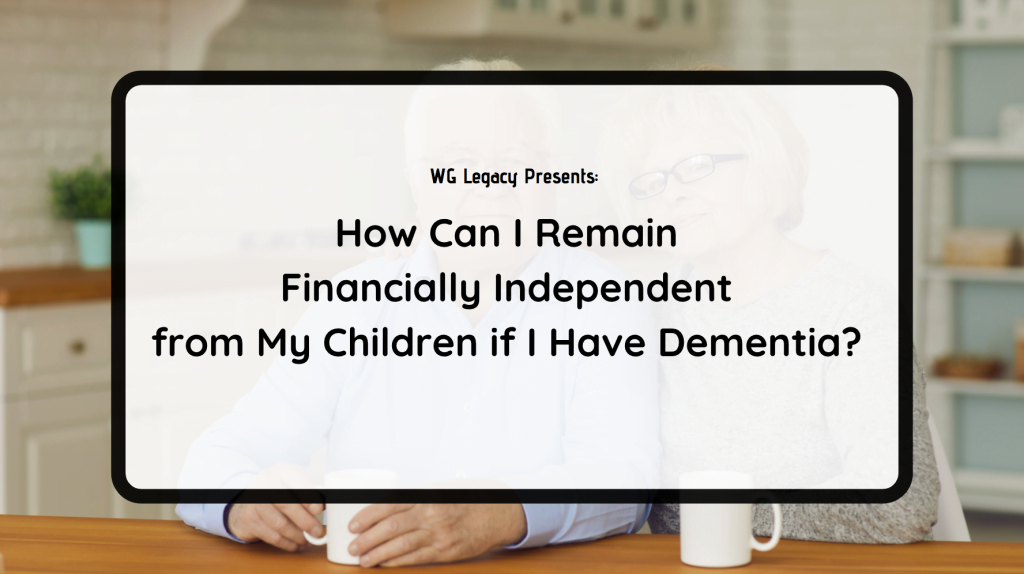Question:
Hi, my name is Anne. I’m 60 years old and I’m living with Mike, my husband in a terrace house in Puchong. Both of us are retirees. We have two children. Amy is our eldest and she is residing in Australia with Donald, her husband and Donna, their daughter. Meanwhile, Sam, our son, was recently married to Lisa and they both have just moved into another terrace house that my husband and I own in Subang Jaya.
My husband and I wish to not be a burden to both Amy and Sam in the event, if one of us suffers from dementia or becomes physically immobile in the future. I am budgeting around RM 500,000 each for Mike and myself for this purpose. In light of this, our question is, ‘Should Mike and I set up a joint bank account with Sam, my son so that Sam can use the money to care for any of us, if we lose our abilities to care for ourselves financially in the future?’
Answer:
The answer is yes.
Mike and Anne can open a joint bank account with Sam and this enables him to retrieve the monies within to care for his parents if they lost their capabilities in managing their financial affairs due to dementia or physical immobility. As I pen this down, I believe there are a few things that Mike and Anne need to consider before opening their joint account with Sam.
It is possible that these concerns relate to some level of financial infidelity.
For instance, let’s say, Anne decides to open a joint account with Sam and Anne puts in RM 500,000 into the account. Anne informs Sam that if one day, she has dementia or becomes immobile, Sam is to send her to a well-run nursing home, where she could be cared for professionally.
Sam can use the RM 500,000 to pay for the nursing home fees and medical bills if they arise. But, in reality, if Anne has dementia or loses physical immobility as a result of an accident in the future, Sam can choose to do any of the following:
#1: Not Sending Anne to Her Preferred Nursing Home
There are many reasons for this.
But, my own bet is on the fees. Maybe, Sam finds that the nursing home fees at the time when Anne has dementia or becomes immobile is expensive. Maybe it is possible for Sam to send Anne to a much better nursing home that is cheaper in fees. Or maybe, Sam just did not want to send his mom to a nursing home so that he could retain the RM 500,000 in the joint account.
Needless to say, there are many ‘Maybes’ in this scenario.
#2: Use the Money for His Own Purposes
Here is a question:
Is it possible for Sam to use the money to fend for his own family, if Sam and/or his wife lost their source of income, either due to a layoff, a pay cut, or business slowdown? If any of the above happens, are you comfortable with Sam in using the money for himself and his family? Are you okay with him going against your original intentions of opening the joint account in the first place?
There are countless ways of how Sam could choose to use the money put in the joint account. They depend on Sam’s life principles and whether or not Sam can be influenced by Lisa, his wife or maybe, his other friends on how he could best use the RM 500,000 in the joint account.
Hence, in Anne’s case, I find that opening a joint account is not totally helpful in caring for herself if she has dementia or becomes immobile in the future.
How Can Anne Remain Financially Independent?
Also, how could Anne be safely assured that her RM 500,000 will be solely used to take care of her, in the event of her having dementia or losing her mobility in the future?
The answer is simple.
Anne could set up her own living trust and place RM 500,000 into the trust. She then could instruct her trustee in the trust deed to do the following:
1. Request the trustee to invest and attain a return of, let’s say, 5% per annum. Thus, this would enable Anne to enjoy some income to fund her retirement lifestyle while she is healthy and alive.
2. Send Anne to her designated nursing home if she has dementia or totally lost her mobility due to an accident. The trustee shall pay for the nursing home fees and medical bills that may arise from the RM 500,000 placed in her living trust.
3. Distribute any remaining money in her living trust if she passes on. Anne may dictate the proportion, the frequencies, and the distribution purposes of all her money in the living trust to her nominated beneficiaries. For example, after she passed on, the remainder money in the living trust could be distributed to:
a. Mike, Amy, and Sam in full and in proportions of Anne’s choice or,
b. Anne’s grandchildren for their tertiary education fees in the future or,
c. Anne’s other relatives and charitable or non-profit organisations or,
d. A combination of any of the three stated above.
This would be a better approach as setting up a living trust will significantly add financial certainty to Anne because she knows exactly that the money would be used in accordance to her intentions as stipulated in her own trust deed.
Thus, this will eliminate the risk of financial infidelity from her family members.
Also, this would free Anne’s family members (especially Sam) of their effort and time to care for Anne as she had already stated her intentions in the trust deed.
Conclusion:
In past generations, it was the norm for children to take care of parents as soon as they attained adulthood. However, this is changing as parents today realise a need to continue to fend for themselves financially so that they can avoid being burdensome to their children and remain financially independent on their own.
Living trust is considered as a financial tool due to its versatility in its uses when it comes to financial planning. Thus, if you like to know how you could establish your own living trust for the purposes discussed above, you could start by filling in the details below to book yourself a 30-minute consultation session with our professional estate planner:




